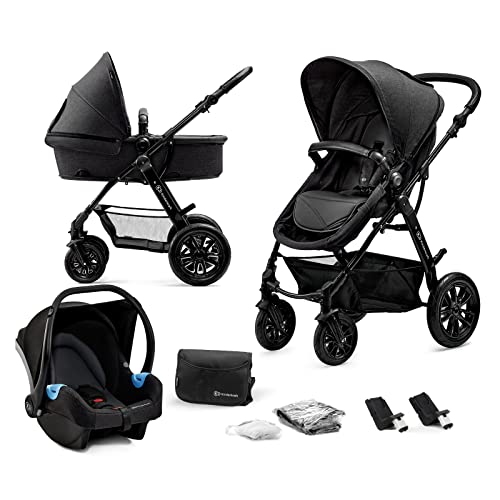15 Up-And-Coming Prams Newborns Bloggers You Need To Be Keeping An Eye On
The Comprehensive Guide to Choosing the Right Pram for Newborns
The arrival of a newborn brings both tremendous delight and a range of decisions that moms and dads must browse. One of the essential purchases is selecting the best pram, which not only ensures the baby's security but likewise provides convenience for moms and dads. This guide intends to offer a thorough appearance into choosing the appropriate pram for newborns, talking about different types, functions, safety factors to consider, and maintenance ideas.
Understanding the Types of Prams
Prams differ commonly in style and functionality, which can be frustrating for brand-new parents. Here's a breakdown of the most common kinds of prams offered in the market:
Type of Pram
Description
Pros
Cons
Traditional Prams
Designed for babies, these prams normally have a deep bassinet.
Comfy for newborns, Safe for sleeping.
Large and heavy, Hard to steer in tight areas.
Travel Systems
A combination of an automobile seat and a stroller, permitting easy transition between automobile and stroller.
Flexible and convenient, Cost-effective.
May be heavier than standalone strollers, Not all components are appropriate for newborns.
Lightweight Strollers
Compact and easy to steer, these are perfect for parents on the go.
Portable and simple to utilize, Generally more inexpensive.
Less cushioning, May not recline fully for newborns.
Convertible Strollers
Strollers that can adapt from a carrycot for newborns to a young child stroller.
Multi-functional and lasting, Adjustable configurations.
Can be pricey, May need more maintenance.
All-Terrain Strollers
Developed for rough terrains, these strollers typically feature larger wheels.
Long lasting for outside use, Stable on numerous surface areas.
Heavier and bulkier, Can be tough to guide indoors.
Secret Features to Consider
When choosing a pram for newborns, several features can substantially affect functionality and security. Here are vital features to remember:
- Safety Harnesses: Look for a pram that consists of a five-point safety harness to ensure the baby stays protected while in transit.
- Reclining Seat: A fully reclining seat enables newborns to lie flat, which is vital for their spinal column and breathing health.
- Suspension System: A good suspension system provides a smoother ride, necessary for the delicate bodies of newborns.
- Brake System: Ensure the pram has a dependable brake system to prevent mishaps. Hand brakes or foot brakes can be reliable alternatives.
- Storage Space: Consider a pram with ample storage space for diaper bags, shopping, or other essentials.
- Weight and Foldability: Choosing a light-weight option that folds easily is important for benefit, particularly for mass transit.
Security Considerations
Focusing on security is vital when it comes to prams for newborns. Here are vital security ideas to make sure the well-being of your baby:
- Check for Stability: Make sure the pram remains steady when stationary. A large base can offer increased stability.
- Prevent Overloading: Only location products recommended by the producer in the storage basket; excess weight can result in tipping.
- Routine Maintenance: Inspect the wheels, brakes, and harness systems regularly to ensure they operate effectively.
- Buckle Up: Always utilize the safety belt, even for fast journeys, to prevent the baby from slipping or falling out.
- Look For Age Recommendations: Follow the producer's guidelines concerning weight limits and age suggestions for security.
Maintenance Tips
Taking care of a pram guarantees its durability and safety for your newborn. Here are vital upkeep pointers:
- Regular Cleaning: Wipe down the pram frame and wash materials according to maker guidelines to keep it hygienic.
- Inspect the Wheels: Check wheels for damage and tidy them regularly to avoid obstructed motion.
- Check Folding Mechanism: Ensure the folding system operates smoothly without sticking or jamming.
- Lube Moving Parts: Apply the proper lube to moving parts to ensure peaceful and smooth operation.
- Store Properly: When not in usage, store the pram in a dry location to avoid rust and maintain fabric integrity.
Often Asked Questions (FAQs)
1. The length of time can a baby remain in a pram?
For newborns, it is typically recommended to limit uninterrupted time in a pram to about 1-2 hours to prevent issues with advancement and circulation.
2. Which pram is best for a newborn?
The very best pram for a newborn is one that offers a completely flat recline, has an excellent safety harness, and meets existing security requirements. Lots of moms and dads prefer travel systems for their adaptability.
3. Can I utilize a stroller without a safety seat for a newborn?
It's recommended to utilize a stroller with a flat or near-flat recline for newborns. Some strollers are just ideal from six months and up, so inspect the producer's assistance.
4. When should I switch from a pram to a stroller?
You can move from a pram to a stroller when your baby can sit up separately, usually around 6 months, however this can vary. It's constantly best to seek advice from the private pram or stroller guidelines.
5. What is the very best method to clean my pram?
Always refer to the maker's instructions, but generally, you can clean up materials with moderate soap and water and clean down tough surface areas with disinfectant wipes.
Selecting the right pram for a newborn is a substantial decision that impacts both the baby's comfort and the moms and dad's way of life. By understanding visit my web site of prams readily available, crucial features to consider, safety methods, and maintenance ideas, parents can make informed choices that improve their family's movement and ensure the safety of their children. Investing time in research study now settles in the long run for satisfying outings and valued memories.
